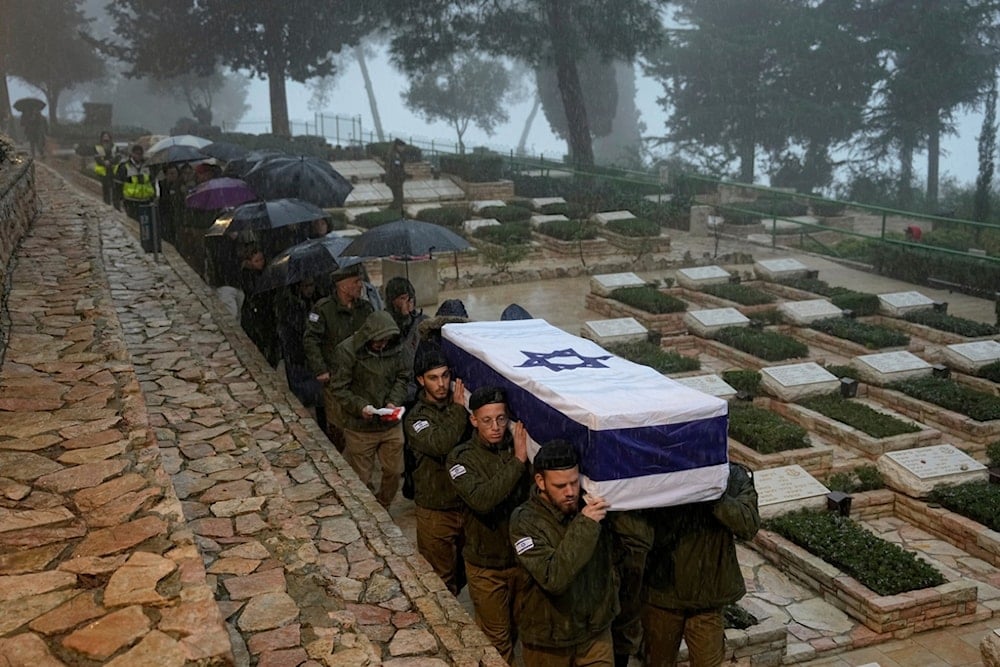Israeli occupation admits 1,152 soldiers killed since October 7
The Israeli Security Ministry confirmed that 1,152 soldiers have been killed since October 2023, with nearly half under the age of 21.
-

Israeli soldiers carry the flag-draped casket of a reservist at his funeral at Mt. Herzl military cemetery in occupied al-Quds, Tuesday, January 23, 2024. (AP Photo/Ohad Zwigenberg)
The Israeli Security Ministry on Monday acknowledged significant losses within its ranks, confirming that 1,152 soldiers have been killed since the launch of Operation Al Aqsa Flood on October 7, 2023.
According to the Israeli Army Radio, nearly 42% of those killed, 487 soldiers, were under the age of 21, while 141 were over 40, most of them regular and unmarried troops.
The report also revealed deep social repercussions stemming from the rising death toll. More than 6,500 relatives of fallen soldiers have joined what the occupation refers to as its "bereaved list," including 1,973 parents, 351 widows, 885 orphans, and 3,481 siblings, reflecting the growing societal strain on "Israel's" internal front.
Data published by the Israeli military showed that the fatalities included 1,035 army personnel, among them 43 from emergency units, as well as 100 occupation police officers, nine Shin Bet agents, and eight members of the Israeli Prison Service.
Army Radio detailed the age distribution of the dead as follows: 487 under 21, 337 between 22 and 30, 187 between 31 and 40, and 141 over 41. It added that 1,086 of the dead were men and 66 were women.
The Israeli Army has been waging a relentless war against the Palestinian people in both Gaza and the West Bank for nearly two years, following the resistance-led Operation Al Aqsa Flood.
A crisis extending beyond the battlefield
The mounting death toll has been accompanied by a deep psychological breakdown within Israeli forces. According to Israeli media, more than 43 soldiers have died by suicide since October 2023, as prolonged deployments and exposure to battlefield trauma trigger widespread mental distress.
A joint study by Tel Aviv University and the army found that 12% of soldiers are now suffering from post-traumatic stress disorder (PTSD), marking an unprecedented rate in the occupation’s history.
By September, Israeli outlets reported that over 1,100 soldiers had been discharged from service due to PTSD, while more than 26,000 personnel had sought psychological care since the war began, about one-third diagnosed with trauma-related conditions. This represents a drastic increase from earlier wars, such as the 2006 Lebanon conflict, when only 2% of troops were affected.
In response, the IOF and the Ministry of Security have expanded the Combat Stress Response Unit, opening new regional branches and planning a national rehabilitation center to provide long-term medical and psychological support for affected soldiers and their families.
Long-term human and societal toll
In a related report published in July, Israeli daily Yedioth Ahronoth revealed that over 18,500 Israeli soldiers have been wounded since October 7, thousands of whom suffer from severe psychological trauma.
The paper added that, at the current pace, the number of wounded could reach 100,000 by 2028, underscoring the enduring human cost of the occupation's ongoing war on Gaza.
As fatalities, injuries, and psychological collapses continue to mount, Israeli analysts warn of a broader erosion of military cohesion and rising public fatigue over the war's heavy toll.
The convergence of battlefield deaths, mass trauma, and record suicide rates signals a profound internal strain within "Israel's" security establishment, one that may have lasting implications for its military readiness and social stability.
Read more: IOF shoot 12 Palestinians in Beit Lahm amid massive West Bank raids

 4 Min Read
4 Min Read










